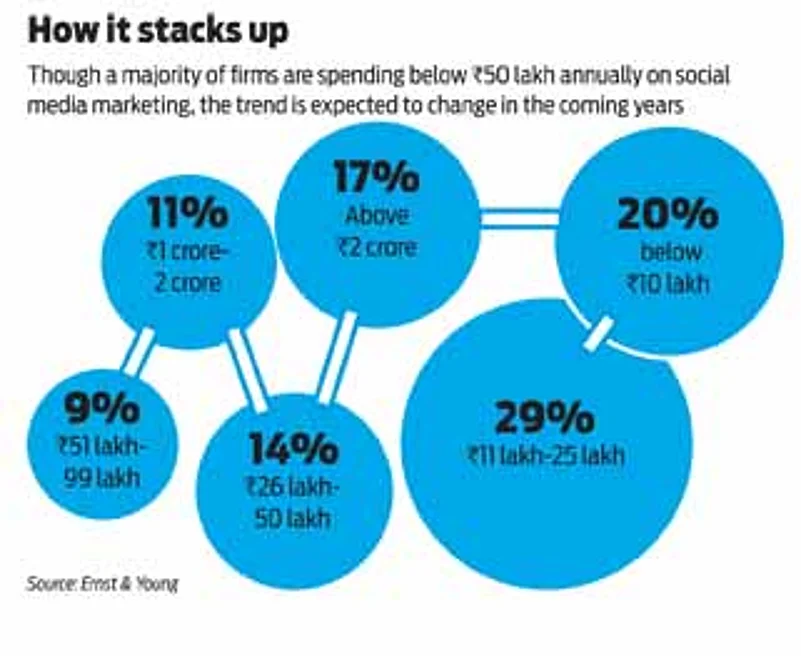Six years back, Devesh Mishra, 55, was just another obscure taxi driver haggling with stubborn customers in Varanasi. The earnings were poor and the running cost high. Mishra had heard about the Internet but had neither the expertise nor access to advertise his service. Stuck with this dilemma, Mishra asked one of his passengers, a Swiss national, to help him out. The tourist recorded a two-minute clip for Mishra and posted it on YouTube. That post got over 50,000 hits, and Mishra, a whole lot of customers from home and abroad. His earnings jumped from Rs. 5,000 a month to close to Rs. 35,000 now. He has a Facebook page and offers tours not just around Varanasi, but to Rajasthan and even Kolkata, all this without spending a rupee.
Mishra’s is just one of many stories of how businesses, big or small, are using social media platforms as effective marketing and consumer engagement tools.

According to a 2013 survey by Ernst & Young on social media marketing, 30 per cent of firms’ social media marketing budgets were between Rs. 11 lakh and Rs. 25 lakh. Engaging the market through such platforms not only helps firms reduce costs, but also improves marketing efficiency.
For Bengaluru-based Edureka, an online education platform offering live instructor-led technology and business courses to professionals and students, the target audience is the student market in India, USA, the UK, EU and Australia.
Since the nature of their business requires them to connect, engage and track their present and prospective customers across the globe, using social media for marketing purposes is something the firm heavily relies on. “Among our marketing channels, it is one of the key pivots,” explains Lovleen Bhatia, co-founder, Edureka.
Edureka plans its campaigns around YouTube, Facebook and LinkedIn, backing up with regular engagement over Twitter and Google Plus. They also conduct strategic blogging through domain specific bloggers to reach, interact and engage with their customers.
While it works for all businesses, social media is an effective tool for startups, especially because it enables the brand to connect to its customer faster. It is budget-friendly and helps save time, both of which are limited for a startup in the initial phase. Edureka’s YouTube channel has 700 videos and over 19,000 subscribers. “YouTube videos act as a bank of active information source through which customers from foreign countries can easily learn about Edureka and its offering. After going through the videos, a lot of students decide to take our course. The most successful conversions (around 20-25 per cent) come from this channel. We can safely attribute 4-5 per cent of our revenues to it,” says Bhatia. When it comes to Facebook, its custom targeting feature allows them to reach a receptive audience. “A good 20 per cent of our conversions used to come from Facebook. The cost per acquisition is also low for the channel,” says Bhatia. “The most significant part of social media marketing, however, is that it is a “two-way” medium, unlike radio, television and print. Social media marketing is driven not just by content, but also by conversations and interactions,” says Neil Sequeira, founder and managing director, Buzzfactory Interactive, a digital marketing firm. That makes most businesses click.
It is important to choose the platforms for engagement and use each platform for a purpose it is best suited to. “The decision to leverage social media and to put a strategy into place has to be very long term since the returns are also long term,” says Sequeira. Building such a strategy is a lot like deciding what kind of a personality would you like your business to have or how would you like others to perceive your business online.
Engage
“Social media engagement is driven by great content and conversations,” says Sequeira. On social networking sites, it is important to keep the content you are posting interesting. Social media engagement is about evoking a response or action whether the person at the other end ‘likes’, ‘shares’, ‘comments’, ‘re-tweets’ or responds in some way to the content you have posted.
For CashKaro.com, a cashback and coupon site, social media acts as a mode to interact with their users and to apprise them of the newest offers and cashback deals. “We regularly run campaigns and contests to engage with our audience to build a long-term association,” says Swati Bhargava, co-founder, CashKaro.com.
Play right
There is, however, a word of advice. Chetan Kulkarni, co-founder and CEO, Vizury, a digital CRM company, says that businesses must avoid the common mistake of trying to be too in-your-face and not align the campaign with their overall marketing strategy.
It should also merge seamlessly with the user experience and should not come across as someone intruding in their personal or social space.
One should track their performance on social media platforms using common analytical tools so that they can improvise and get the maximum benefit out of it. The importance of social media in marketing cannot be overstated and playing it right will help you march ahead of competition.
Build your social quotient
Devise a social media strategy: Choose the platform according to your brand and target audience and the social media platforms they frequent
Platforms: Facebook, Twitter, YouTube, LinkedIn, Google Plus, Instagram, Pinterest, Vine
Have a content plan: Create, discover and share original or relevant content that is interesting, useful or helpful and caters to the customers’ needs and emotions
Useful tools: Moz’s Fresh Web Explorer, Google AdWords Keyword Planner, Go Fish Digital
Engage your users: Be interesting, fresh, relevant, engaging and interactive with your content. Listen to your user and promptly respond to queries. Incentivise customers to participate in conversations.
Use social media management tools: These tools help you manage and monitor your marketing activities across multiple platforms
Useful tools: HootSuite, HubSpot, SocialOomph, SproutSocial, Postling, Sendible
Track social media effectiveness: Track the effectiveness of your social media campaigns so that you can tweak them for better performance.
Useful tools: Facebook Insights, YouTube Analytics, Google Analytics, Buffer, Social Mention, NetBase, Crowdbooster, Topsy
Don’t worry about the costs: The best part about social media marketing is that it can be deployed without spending millions































